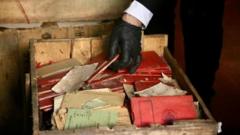Crates containing documents from the era of Nazi Germany have been rediscovered in the basement of Argentina's Supreme Court, sparking interest among historians and officials. This remarkable find occurred while workers were clearing the basement ahead of the relocation of the court's archives to a new museum.
The documents originated from the German embassy in Tokyo and were sent to Argentina on June 20, 1941, embedded within 83 diplomatic pouches transported aboard a Japanese steamship. According to records kept by court officials, these items eventually made their way to the Supreme Court after being confiscated by local customs officials, who discovered Nazi propaganda materials when inspecting five of the pouches.
Initially spotted by workers intrigued by wooden champagne crates, the documents were opened to reveal materials promoting Adolf Hitler's ideology in Argentina during World War II, as noted by court officials in a statement. Following their discovery, the crates were securely relocated within the court, and the Buenos Aires Holocaust Museum was enlisted to assist in cataloging the contents.
Among these documents are photographs and membership booklets adorned with swastikas. Historians are optimistic that these findings might unveil information regarding Nazi financial networks and international connections.
Argentina's Supreme Court released details about the documents, noting that they were labeled as "personal effects" by the German embassy in Buenos Aires at the time of their arrival. Concerns about the shipment's size and contents prompted Argentine customs officials to alert the foreign minister, suspecting possible implications for the nation’s neutral position during the war. When five pouches were randomly opened, officials found postcards and propaganda materials, leading to a judge's order in September 1941 for the confiscation of all 83 pouches.
Despite being under the jurisdiction of the Supreme Court, no decision regarding the documents was made until 1944, by which time Argentina had severed ties with Axis powers, resulting in the documents being neglected in the basement for decades. Following WWII, Argentina, under Juan Perón, became a refuge for prominent Nazis, including figures like Adolf Eichmann and Josef Mengele. The issue of the nation's past involvement in harboring Nazi criminals was formally addressed by President Fernando de la Rúa in a 2000 apology.






















